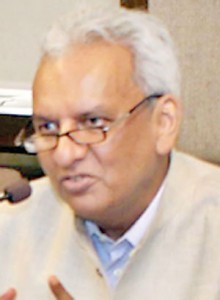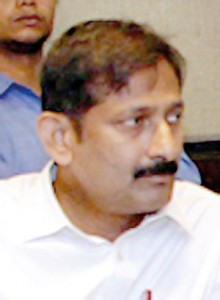News
Indian ministerial delegation here soon as ETCA finalising nears

Jayant Prasad
As part of the negotiations regarding the signing of the proposed Economic and Technology Cooperation Agreement (ETCA) a delegation headed by India’s Minister of Commerce and Industry Nirmala Sitharaman will be in Colombo by the end of this month to expedite the process.
The much debated economic pact proposed between India and Sri Lanka is in the process of completing negotiations as the two countries have realized their future lies in signing such a comprehensive agreement.
Last week during a meeting with a visiting Sri Lankan delegation of journalists in New Delhi, key Indian economic policy experts noted that as an immediate and close neighbour, occupying a strategic position, its economic prosperity was to India’s benefit lending stability to the region.
The delegation, included a group of academics, researchers, former diplomats and policy makers attached to the Institute for Defence Studies and Analyses (IDSA), a renowned and influential think tank in New Delhi.
The ISDA group was headed by Jayant Prasad, Director General and comprised resource persons including Dr. Ashok K. Behuria who is a Research Fellow at ISDA
While upgrading the existing Indo – Lanka Free Trade Agreement (FTA ) into a comprehensive agreement such as as ETCA, India is willing to partner with its neighbours more effectively, they said.
“India has become a business hub with a remarkable growth rate and most of its policies are being directed to find common ground that will enable cooperation and strengthening bilateral ties with its neighbouring countries. India uses its capabilities and capacities to extend its cooperation directly or indirectly to its neighbour, even in security matters too,” they argued.
Soon after the new government took office in Colombo, bilateral ties between the two countries intensified rapidly as it had never been before in the history of Indo-Lanka relations. High level meetings were held between the senior officials in both governments followed the visit of Indian Prime Minister Narendra Modi last year.
Concluding his two-day visit to India on Tuesday to speed up the negotiations, Development Strategies and International Trade Minister Malik Samarawickrama noted that for India, Sri Lanka is the largest trading partner in SAARC, as well as the largest export market in the South Asian region.
“I believe we can do far better in terms of attracting investment from India. In my view, I am confident we are creating conditions, which will be conducive for leveraging the trade – investment nexus in a positive way. This is also the best way to address our large bilateral trade deficit with India,” he said.

Dr. Ashok K. Behuria
Investments from the private sector are crucial to create a win-win situation to both countries. Mr. Samarawickrema encouraged Indian investors to participate in Sri Lanka’s development through the establishment and management of Industrial Zones while highlighting investment opportunities which are becoming available in the Western Region Megapolis Plan, including the Port City Project and also the Area Development Programmes for Trincomalee.
He pointed out that trade between the two countries could be increased and become more balanced for Sri Lanka, including through bilateral arrangements for trade, investment, technology and training. The Sri Lanka – India CEOs forum is to be reconstituted and convened at an early date as another step to clear the way for the agreement.
The intention is to deepen the current agreement in goods by reducing the negative list on the basis of less than full reciprocity and widen it to include services, investment, technology and training. It will open up new opportunities for Indian and other foreign investors to locate in Sri Lanka to access the markets of the fastest growing large economy in the world on a preferential basis.
India is of the view that the two countries should look at the potential capabilities the two countries have for a much broader and ambitious platform where goods, services and investments can flow in mutual ways.
“Given the experience we had over the changing pattern of economic development of the two countries, I think Sri Lanka has a lot of attractions which a comprehensive framework like ETCA would open up,” a senior official of India’s External Affairs Ministry said.
As negotiations for ETCA get underway, the Sri Lankan public will see a remarkable change when new market access, employment opportunities and new technologies are introduced to the country.
Local professionals bodies that represent doctors, engineers, architects, IT professionals continue to oppose the proposed agreement claiming that it will make a significant impact on the local industry and local labour with the arrival of Indian goods and services.
To give an example to counter the common slogan in these protests that read “Indians are waiting to invade the IT sector in the country”, the plain truth is very simple. Indian IT companies are still seeking highly skilled professionals for recruitment. The professionals’ first choice would be the United States (US) where there is still a huge demand in the IT sector.
The economic development of the two countries has to move on to the next level for mutual prosperity. Today Sri Lanka is opening up its economy for investment as a first step to be part of the global economy.

